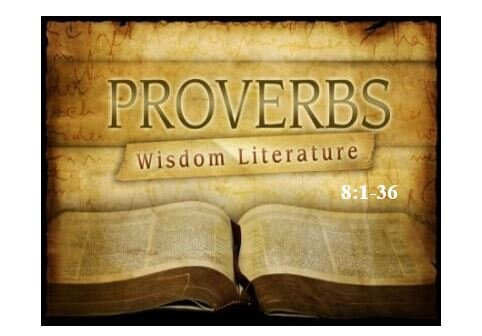Proverbs 8: 1-4, 22-31 is the First Reading appointed for Trinity Sunday in the Year of Luke. It is a fascinating reading in that Wisdom, personified as a woman, is front and center as one who was with the Creator prior to all things. One of the most delightful parts of this reading is near the end when the writer notes that Wisdom is daily the Creator's delight. It will be the preacher's task to bring this delight to the listeners.
(The following questions are not meant to be exhaustive, but simply offer a method to discern what the Word is doing in the text, a fundamental concern of Law and Gospel preachers. For more on this method and on Law and Gospel preaching in general, see my brief guide, Afflicting the Comfortable, Comforting the Afflicted, available from wipfandstock.com and amazon.)
1. How does the Word function in the text? The Word is functioning primarily to announce the credentials that Wisdom brings: she was with the Creator before all things. This is good news, therefore a Gospel function.
2. How is the Word not functioning in the text? There is no word of Law here, no word that exposes our need for a Savior. One hint of our need is the language used to express the urgency of wisdom's call: "she cries out," "my cry is to all that live."
3. With whom are you identifying in the text? We are those who overhear Wisdom's call and the Creator's endorsement of her place in all things.
4. What, if any, call to obedience is there in this text? The call to obedience imbedded in this text in verses 5-21: "Listen to what Wisdom says!" Here, in this text, the call is not present.
5. What Law/Gospel couplet is suggested by this text? The couplets that come to mind are simply ignoring/delighting in wisdom; resisting/celebrating wisdom.
6. Exegetical work: It is interesting that the verb in verse 22 is translated as "created" but the Hebrew word is closer to "acquired." Kravitz and Olitzky translate the term "acquired" and understand that Wisdom is the Torah. The Torah is then what, in verse 30, is translated as "master worker." Torah was, in other words, guiding the Creator in creation. (Mishlei, A Modern Commentary on Proverbs, p,80-86). Ancient Christian writers have a predictably different take on these verses. Origen of Alexandria, the influential 3rd century exegete, follows the text faithfully, observing the feminine forms of each verb: "What must we say of wisdom which 'God created at the beginning of his ways for his works?' Her Father rejoiced at her, rejoicing in her manifold spiritual beauty which only spiritual eyes see. Wisdom's divine heavenly beauty invites the one who contemplates it to love." (Ancient Christian Commentary on Scripture, OT, vol. IX, p. 62). Other commentators consistently ignore the feminine verbs and see Christ as the one being described as Wisdom. Eusebius of Caesarea will serve as an example: "The divine and perfect essence existing before things begotten, the rational and first-born image of the begotten nature, the true and only-begotten Son of the God of the universe, being one with many names, and one called God by many titles, is honored in this passage under the style and name of wisdom, and we have learned to call him Word of God, light, life, truth, and to crown all, 'Christ the power of God and the wisdom of God.'" (Ibid.)
7. Consider the insights of the pioneers of the New Homiletic? Charles Rice always asked the question, "What is the listener's shared story in this text?" That might be an important question to ask in approaching this text, particularly because it is a difficult question to answer.
Blessings on your proclamation!

I am deeply grateful for the guidance and support i received during one of the most difficult moments in my life. When i felt hopeless after losing my partner, i was shown a path to reconciliation and healing by Dr Agba. Today, my relationship is stronger, filled with renewed love, trust, and happiness. i will forever be thankful for the wisdom and help that gave me back the person i love. Contact this spiritualist via email on: ( peacefulhome1960@zohomail.com ) or WhatsApp on: ( +2348104102662 )
ReplyDelete